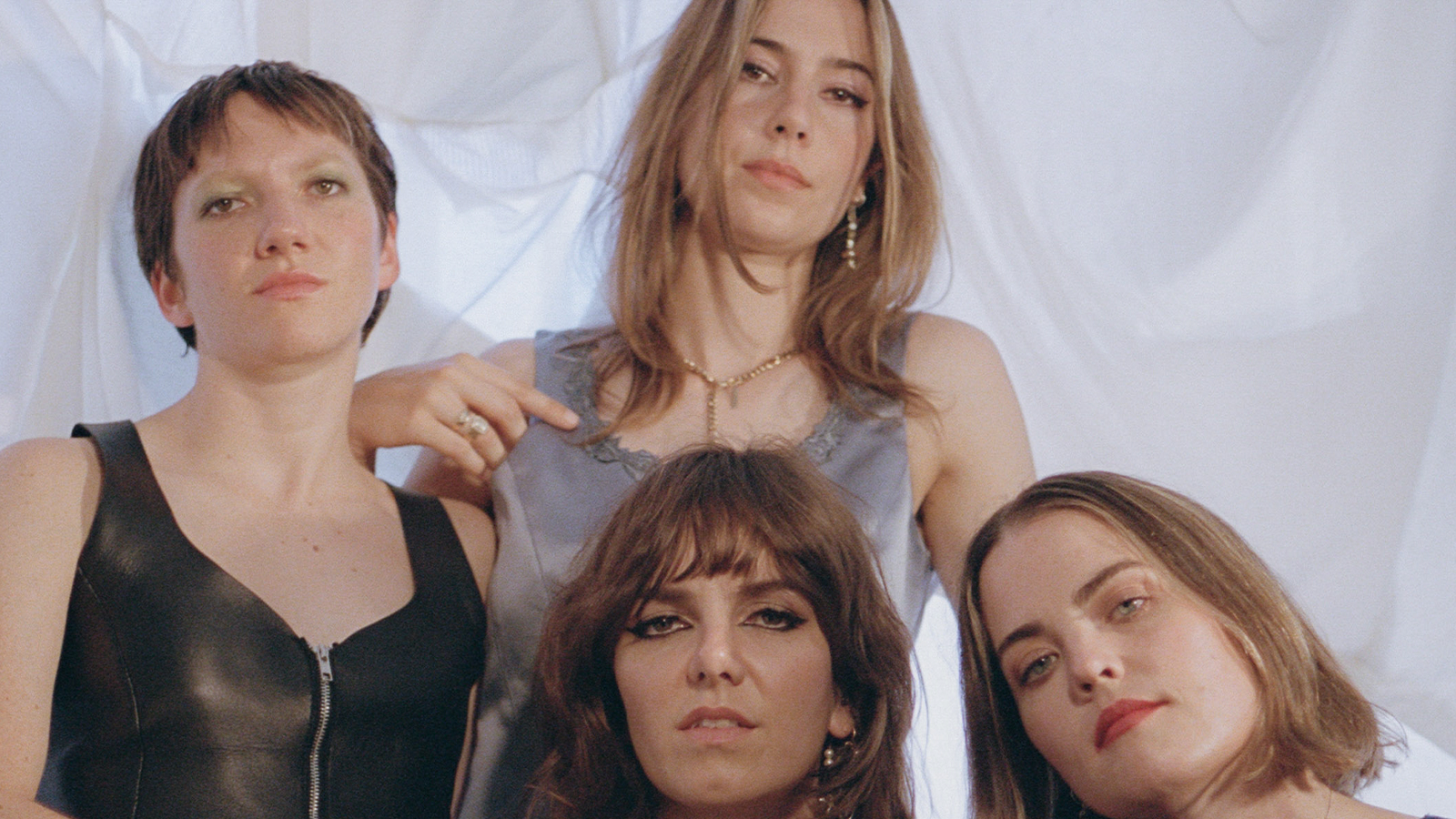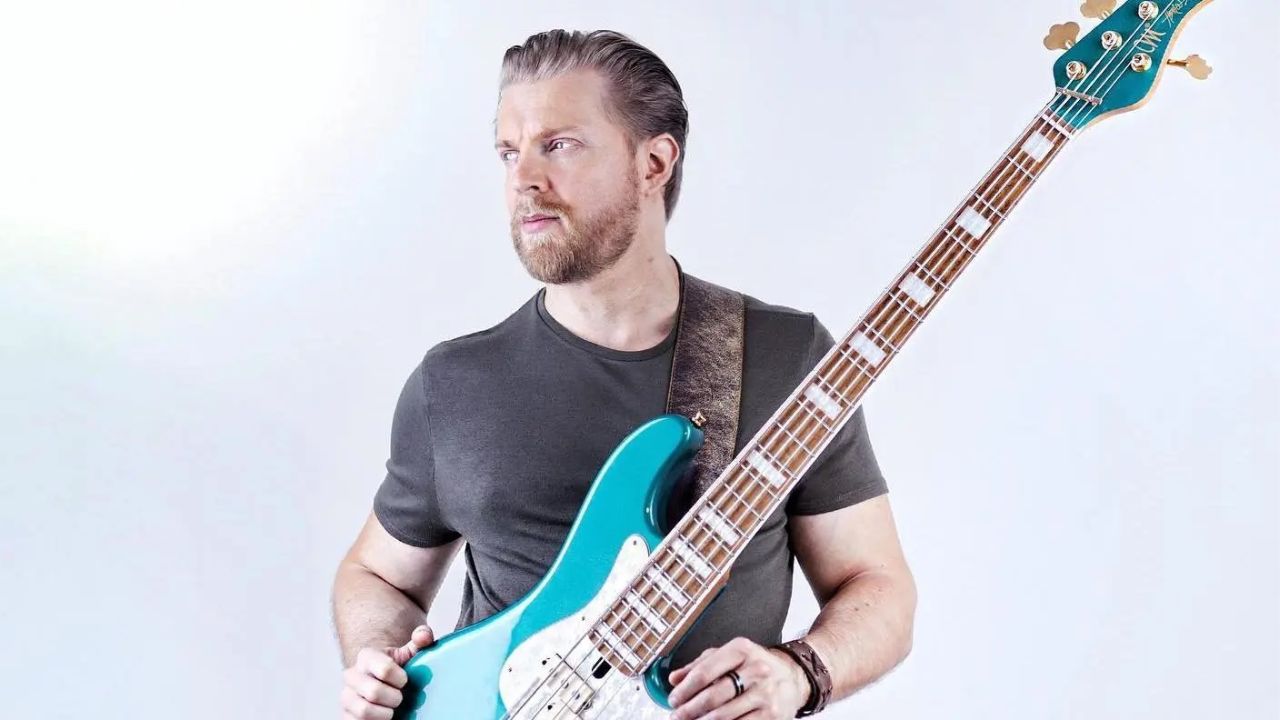Body Type: “This album symbolises us really coming into our own”
With a renewed sense of clarity and amplified confidence, Body Type are ready to take on the world, armed with an explosively enrapturing debut album

Before the pandemic hit, Body Type were en route to hit indie-rock superstardom not just in Australia, but in every continent they could step foot. They formed in 2016 at the very onset of their musical journeys: singer Sophie McComish had only just started learning guitar, and drummer Cecil Coleman could hardly keep a beat, but unfaltering enthusiasm brought them together for a handful of casual jams. Via mutual friends came McComish’s counterpart, fellow singer-strummer Annabel Blackman, and bass queen Georgia Wilkinson-Derums – and by the time they’d chiseled out the tracings of a signature sound, they’d already won over the world.
Punctuated by two EPs – simply branded EP1 and EP2 – Body Type’s early years were defined by gigs at SXSW in the States and the Great Escape festival in the UK, as well as sold-out headliners everywhere from LA to London. They scored approval from the likes of Big Thief, Cate Le Bon, Fontaines D.C. and Unknown Mortal Orchestra.
But in their greenness, Body Type got swept up in a scene that didn’t quite define them; industry vultures swooped in to take control, and soon the path they were on had snaked far from their ambitions. Thankfully, as much became apparent before the band started working on their debut album. Keen to regain control, they snipped the strings that had them tied to “the industry”, funded studio sessions entirely themselves, and set out to make their debut a fully DIY affair. “We were coming out of a period that felt quite suffocating and restrictive,” McComish explained. “We just kind of regrouped and re-energised and did it ourselves.”
The end result, Everything Is Dangerous But Nothing’s Surprising is a fierce – and fiercely confident – walloping of heart-on-sleeve punk. It shows that Body Type aren’t just here to stay – they’re here to slay. We caught up with McComish to riff on just how they brought the album to life.
You recorded this album in early 2020. Have you seen the last two years as an opportunity to sort of mellow out and catch your breath, or is there another album in the wings?
A little bit of both, kind of. There’s definitely another album’s worth of material, but our bass player, Georgia [Wilkinson-Derums], ended up in WA just before the pandemic struck, and then couldn’t get back over here for the longest time. So we’ve got about 20 new songs that she needs to write her parts for – but once that’s all done, I reckon we’ll get back into the studio pretty quickly.
Those two EPs are obviously crucial to the Body Type echelon, but for a lot of people, this will be their introduction to the band. With that in mind, how did you want this record to really encapsulate what Body Type is and means?
I feel like with the EPs, we were kind of learning how to be a band. Because we all came into this project not really knowing what the f*** we were doing – none of us could really play our instruments, and we were all just sort of learning how to do the whole ‘band thing’ together. So the EPs, for me, represent us learning how to make noise and learning how to work as a band, and then this album symbolises us really coming into our own and making the noise that we want to be making. I think it’s a more accurate portrayal of what we’re about and where we’re going, both sonically and thematically.
In the press release, you explained that in the early days of this album’s production, Body Type was “coming out of a period that felt quite suffocating and restrictive”. How did you reckon with that feeling of being held back before you’d even done your debut album?
It was really hard. It was a really confusing period, because you can’t help but get swept up in all this cool, exciting stuff that’s happening, and people come onboard to help you shape where you’re going with your project. And we just got so swept up in that, I think we’ve kind of lost track of our own confidence, and our own ability to recognise what we wanted to be doing and how we wanted do it. So after a while, we were like, “Wait a second, we’ve kind of deviated from the path that we wanted to go down for ourselves here – let’s just bring it back to us for a bit.” And then we started making our own decisions again, and we were like, “Hmm… Actually, we want to record this album now. And we’re gonna do it here. And this is how we’re gonna do it…” And then we did it, and it felt really good!
Get The Pick Newsletter
All the latest guitar news, interviews, lessons, reviews, deals and more, direct to your inbox!
So in endeavouring to capture that restless excitement, how quickly did the record come together?
One of the songs on the record is one of the first songs I ever wrote – so it’s kind of been brewing, technically, for more than five years. But we went on a little writing retreat in the Margaret River at the end of 2019. That was a really massive year for us – we went overseas for the first time, played South By Southwest, then went to the UK, which was just so crazy. We were just on fire after that, so went on this retreat and honed in on about 15 songs. We got into the studio in February of 2020, I think. We were there with our friend Jono Boulet, who recorded it for us, and we were probably in there for about eight days – we got everything we needed, and then it was all mixed and mastered within a month or two after that. So it was pretty quick once we actually got in there.
I feel like it would feel disingenuous to write about this record and refer to one of you as Body Type’s frontwoman – you all bring so much to this record, and you can really hear the chemistry between the four of you. What’s that creative dynamic like?
I live with Annabelle [Blackman, vocals/guitar], so she’s very deeply embedded in everything I do in my life. We’re very lucky, we have a very fluid way of writing together. All of us do. It maybe took us a while to get to that point, but I feel like letting go, and trusting these women that I’m making music with, is one of the biggest lessons I’ve learned from this band. Because when we first started and didn’t really know what we were doing, it was nerve-racking. But we still write the same way, where one person will bring the bones of a song idea – usually the lyrics and the chord progression – and then everyone else would just build on top of that. And that’s such a cool thing, to have found these three women that you can just trust to be like, “Whatever you’re gonna do with your bass playing here, or whatever drums you’re going to put in here, I know it’s going to make song complete.” I feel very lucky to have fallen into this group.
What kind of guitars were you shredding out on for this record?
I think it was probably my Strat, but I’ve recently gone back to playing on the first proper guitar I ever bought, which is a J Mascis Squier. That was my very first electric guitar, aside from this little piece-of-shit Danelectro, which was made of plastic or something. But Annabelle got a really cool guitar that she recorded on for this record. It’s a Reverend – I can’t remember the model, but it was a gift from a label that we worked with for a while; apparently one of the touring guitarists in Sleater-Kinney played it on something. So all of her parts were recorded on that, and that was pretty special.

Ellie Robinson is an Australian writer, editor and dog enthusiast with a keen ear for pop-rock and a keen tongue for actual Pop Rocks. Her bylines include music rag staples like NME, BLUNT, Mixdown and, of course, Australian Guitar (where she also serves as Editor-at-Large), but also less expected fare like TV Soap and Snowboarding Australia. Her go-to guitar is a Fender Player Tele, which, controversially, she only picked up after she'd joined the team at Australian Guitar. Before then, Ellie was a keyboardist – thankfully, the AG crew helped her see the light…
- Ellie RobinsonEditor-at-Large, Australian Guitar Magazine








![[from left] George Harrison with his Gretsch Country Gentleman, Norman Harris of Norman's Rare Guitars holds a gold-top Les Paul, John Fogerty with his legendary 1969 Rickenbacker](https://cdn.mos.cms.futurecdn.net/TuH3nuhn9etqjdn5sy4ntW.jpg)
